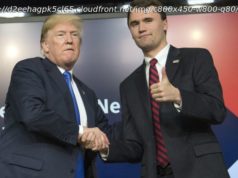Europe sought on Tuesday to find a way to save the Iran nuclear deal without the United States but was short on details about how the accord could survive the reimposition of U. S. sanctions ordered by President Donald Trump.
BRUSSELS (Reuters) — Europe sought on Tuesday to find a way to save the Iran nuclear deal without the United States but was short on details about how the accord could survive the reimposition of U. S. sanctions ordered by President Donald Trump.
British, French and German foreign ministers met the EU’s top diplomat in Brussels a week after Trump abandoned an agreement he branded a “horrible, one-sided deal that should have never, ever been made”.
They will later hold talks with their Iranian counterpart Mohammad Javad Zarif.
Seeking to uphold what the European Union had considered its biggest diplomatic achievement in decades, the 2015 accord rests on allowing business with Iran in exchange for Tehran shutting down any capacity to build an atomic bomb.
Britain’s Foreign Minister Boris Johnson was blunt about the chances of avoiding U. S. sanctions that also seek to prohibit foreign companies from doing business with Iran.
“We have to be realistic about the electrified rail, the live wire of American extraterritoriality and how (it) can serve as a deterrent to business,” Johnson told reporters.
EU foreign policy chief Federica Mogherini, who held a meeting with Zarif earlier in the day, said there could be no guarantees made to Iran but stressed there were measures the bloc could take.
Germany’s Heiko Maas echoed that view. But none of the four, when pressed by reporters, gave any details of their plans. Johnson spoke of the search for a “package of measures.”
Despite the private doubts among many European diplomats, Zarif expressed optimism earlier on Tuesday, saying: “We are on the right path to move forward,” adding that talks with the three European countries would continue in the next two weeks.
The deal between Iran and six world powers lifted most international sanctions in 2016 in return for Tehran curbing its nuclear program, under strict surveillance by the United Nations, to stockpile enriched uranium for an atomic bomb.
Trump denounced the accord, completed under his predecessor Barack Obama, because it did not cover Iran’s ballistic missile program or its role in Middle East conflicts.
The deal’s proponents say it is crucial to forestalling a nuclear Iran and preventing wider war in the Middle East. Britain, France and Germany say they are willing to address Trump’s concerns but that the nuclear deal is the best way to prevent Tehran from obtaining an atomic weapon.
French Foreign Minister Jean-Yves Le Drian also warned of the dangers of ditching the deal, adding that the Middle East was explosive and could be on the cusp of war. NO REGIME CHANGE
EU diplomats said they needed some time to understand the U. S. position.
“One of the questions that we need to ask the Americans is whether their final objective is to make the Iranians yield on its nuclear program or to get rid of the regime,” said a senior French official, acknowledging that Paris was concerned by the ideological shift in Washington since John Bolton was appointed U. S. National Security Advisor.
Before arriving in Brussels, Johnson told Britain’s parliament that regime change in Iran was not a policy Britain should pursue.
French diplomats said they also wanted to assess Iran’s intentions in sticking to the deal, but also to see how open it was to serious talks on other Western concerns, including its ballistic missile program and regional activities.
Annulment of the accord could tip the balance of power in favor of hardliners looking to constrain pragmatist President Hassan Rouhani’s ability to open up to the West. If it falls apart, he could become politically vulnerable for promoting the accord. Supreme Leader Ayatollah Ali Khamenei, not Rouhani, has the last say on all state matters.
European diplomats acknowledged that the EU support, however sincere, risked looking hollow after Trump reimposed an array of wide sanctions last week on Iran that will hit European companies investing there.
The U. S. Treasury announced on Tuesday more sanctions on officials of the Iranian central bank, including Governor Valiollah Seif, for allegedly moving millions of dollars on behalf of the country’s Revolutionary Guards Corps to Lebanon’s Shi’ite Hezbollah group.
The EU, which with Germany, France, Britain, Russia, China and the United States signed the nuclear accord, does have some steps it can take to shield European business in Iran.
They include retaliatory sanctions, allowing the European Investment Bank to invest directly in Iran and coordinating euro-denominated credit lines from European governments. But the reach of the U. S. financial system, the dominance of the dollar and the presence of European companies’ operations in the United States all weaken any potential EU measures.
“It is going to be very difficult for us to preserve the economic benefits of the Iran deal,” one senior European diplomat said. “We will try to uphold our side of the bargain.”






